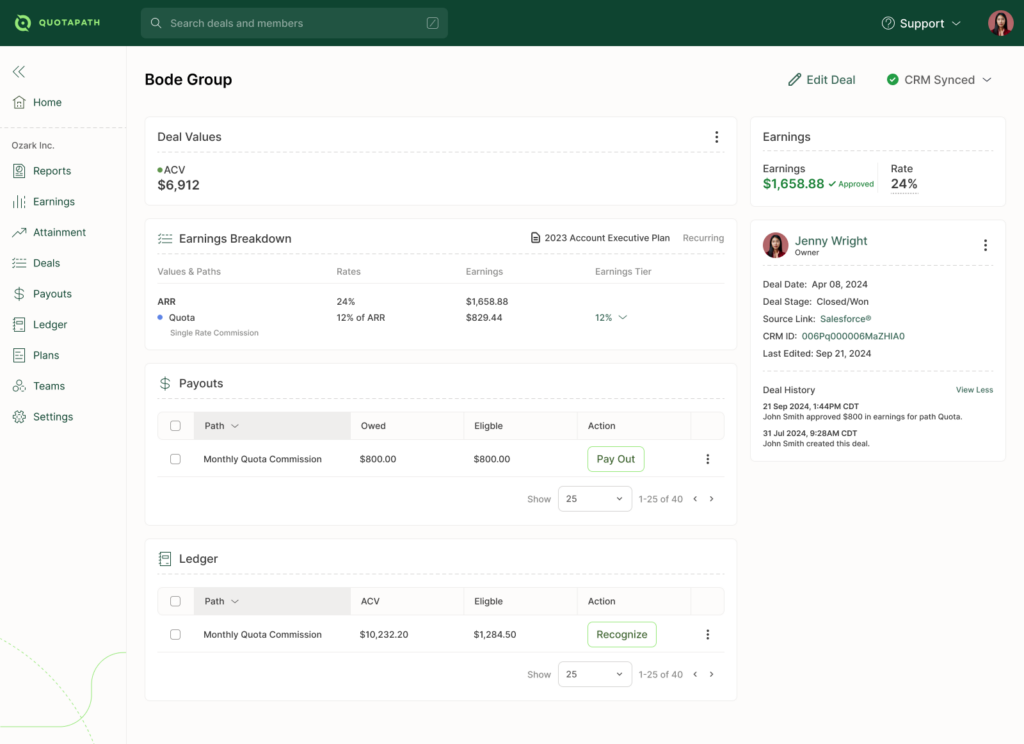Sales commissions are a powerful motivator, but a poorly managed commission tracking system (whether manual or software) can lead to frustration, confusion, and even mistrust from your revenue team.
This mistrust can end in rep turnover, with 9% of reps quitting over a commission dispute, according to our 2024 study.
Streamline commissions for your RevOps, Finance, and Sales teams
Design, track, and manage variable incentives with QuotaPath. Give your RevOps, finance, and sales teams transparency into sales compensation.
Talk to SalesThink about it.
A star salesperson exceeds their quota by a mile, only to face delays or discrepancies in their commission payout due to unclear guidelines or manual calculations. Conversely, a well-oiled commission tracking system with clear rules, real-time data access, and consistent payouts can unlock peak performance and a highly motivated sales force.
Here’s why mastering sales commission tracking is crucial:
- Transparency and Trust: A clear and documented commission plan with readily available data builds trust and empowers reps to focus on closing deals.
- Motivation and Efficiency: Real-time commission progress keeps reps engaged and allows them to adjust their strategies for maximum earning potential. Sales commission tracking software eliminates time-consuming manual calculations, freeing up time for selling.
- Fairness and Accuracy: Standardized deal qualification and detailed deal tracking ensure everyone follows the same rules and that commissions are distributed accurately. Plus, regular audits maintain a system of checks and balances following ASC 606.
In a worst-case scenario, your top-performing rep will join the 9% of reps who quit after too many inaccurate commission checks. Another worst case? When a company tries to cap commissions in response to a rep closing a bluebird deal (a large outlier deal), refusing full payouts, and breaking the original rules laid out in their commission policy.
Conversely, a company that adopts commission tracking best practices paired with fair, logical, and competitive compensation structures can recruit and retain some of their best sellers.
10 Commission Tracking Best Practices
By incorporating these best practices, you can transform your commission tracking system from a source of friction to a powerful tool that fuels sales success.
- Clearly Defined Commission Plan: Ensure your sales team has a clear and documented understanding of the commission structure. This includes details like:
- Earning potential (base salary + commission)
- Commission rates (percentage of sales or tiered structure)
- Defined qualifying factors for commission payouts (e.g., closed deals, upsells, demos booked)
- Note: It’s also a best practice to provide documentation that breaks down their plan, plus when and how they are paid. Learn more about QuotaPath’s Plan Verification.
- Technology: Implement and integrate a CRM with commission tracking software to automate data collection and minimize manual calculations. This will reduce errors and streamline the process.
- If you’re not ready to implement compensation management software, standardize manual tracking by downloading our Google Sheets Commission Template. This will ensure your reps aren’t building their own spreadsheet with flawed logic. (Learn more about how QuotaPath integrates with Google Sheets.)
- Real-Time Data Visibility: Provide sales reps access to their commission progress and key metrics. This transparency fosters motivation and allows them to adjust their strategies if needed.
- “Our reps realized they could run scenarios and see how much they could earn from our monthly kickers,” said Joe St. Germain, VP of Sales at Blackthorn.
- Standardized Deal Qualification: Establish clear criteria for a qualified deal that triggers a commission payout. This ensures fairness and consistency in commission calculations.

5. Detailed Deal Tracking: Maintain a detailed record of each deal’s progress, including customer information, quote details, and relevant milestones. This provides a clear audit trail for commission calculations and dispute resolution.
6. Win/Loss Reporting: Track wins (closed deals) and losses to identify trends and areas for improvement. Analyze reasons for lost deals to determine potential adjustments to the commission structure or sales training needs.
- Read more RevOps best practices.
7. Regular Commission Payouts: Establish a consistent and timely payout schedule for commissions earned. This predictability motivates reps and demonstrates the company’s commitment to fair compensation.
- Later-stage companies typically schedule commission payouts at the start of the contract, while early-stage companies paying close attention to cash flow will schedule payments upon receipt of invoice payment.
- 5 RevOps leaders share commission payment terms tips
8. Commission Cap Considerations: Don’t do it. If you have a rep break the comp plan with an exorbitant payout, pay the rep and adjust the subsequent plans to protect it.
9. Internal Controls and Audits: Maintain a system of internal controls to ensure accuracy in commission calculations. Regular audits can identify potential discrepancies and maintain trust in the system. This is a commission tracking best practice and an accounting liability if you fail to comply with ASC 606.
10. Open Communication: Maintain open communication with your sales team regarding the commission structure and any changes or updates. We recommend checking out this blog to learn best practices for communicating a new comp plan with your team.
Address concerns promptly and foster a transparent environment.
- Communicate and document the same message every time you review the plan.
- Use multiple formats to explain the new plan.
- Provide an FAQ document.
- Share commission calculation examples.
- Communicate the reasons and advantages of plan changes and how the company plans to support reps through these changes.
- Avoid confusing or vague language.
- Explain how achievement relates to earnings.
Try QuotaPath for free
Try the most collaborative solution to manage, track and payout variable compensation. Calculate commissions and pay your team accurately, and on time.
Start TrialConclusion: Streamline Commission Tracking
To wrap up, a well-designed commission tracking system isn’t just about numbers; it’s about empowering your sales force and fostering a culture of trust and high performance.
Implement the above best practices to boost sales motivation, increase efficiency and accuracy for your accounting and RevOps teams, and minimize disputes.
To eliminate the time investment and formula-filled work required to set your commission spreadsheet, check out QuotaPath for streamlined workflows. You can sign up for a free trial or schedule time with our sales team for a custom demo.
See how real-time data, automated calculations, and customizable dashboards transform your commission tracking from a headache to a sales performance driver.


